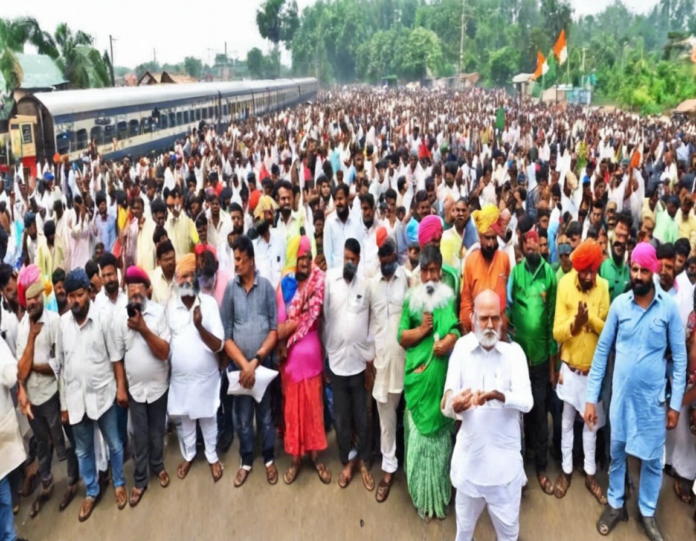On the outskirts of a small rural town in India lies the Shambhu Railway Station, a place that has recently become a focal point for farmers' protests. These protests are not just about agriculture; they are a cry for justice, for fair treatment, and for the protection of the livelihoods of those who work the land. The farmers who have gathered at Shambhu Railway Station are demanding their rights, raising their voices against policies that they believe are hurting them and their communities. In this article, we will delve into the details of the Shambhu Railway Station farmers' protest, the issues at stake, and the broader context of agricultural challenges in India.
The Background of the Shambhu Railway Station Farmers Protest
Current Situation
The farmers' protest at Shambhu Railway Station is part of a larger movement that began in late 2020 when the Indian government passed three controversial farm bills. These bills sought to liberalize the agricultural sector by allowing farmers to sell their produce directly to private buyers, bypassing the traditional agricultural markets known as mandis. However, many farmers and their representatives argue that these bills favor large corporations and weaken the protections that farmers have enjoyed for decades under the existing system.
Grievances of the Farmers
The farmers at Shambhu Railway Station, like their counterparts in other parts of the country, have several key grievances. They argue that the new farm bills will lead to the dismantling of the mandi system, leaving them vulnerable to exploitation by big agribusinesses. They also fear that the bills do not guarantee them minimum support prices for their crops, a safety net that has long been in place to ensure farmers receive fair compensation for their produce.
Response from the Government
The Indian government has defended the farm bills as necessary reforms that will modernize the agricultural sector and benefit farmers in the long run. However, farmers remain unconvinced and have continued to press for the repeal of the laws.
Challenges Faced by Indian Farmers
Economic Hardship
Indian farmers have long faced economic hardships due to factors such as unpredictable weather patterns, rising input costs, and volatile market prices. The introduction of the new farm bills has only added to their uncertainty, prompting many to take to the streets in protest.
Lack of Infrastructure
One of the major challenges faced by Indian farmers is the lack of modern infrastructure, such as cold storage facilities and transportation networks, which would help them preserve and transport their produce more efficiently. Without such resources, farmers are often forced to sell their crops at lower prices or watch them spoil before reaching the market.
Debt Burden
Many Indian farmers are trapped in a cycle of debt, borrowing money at high interest rates to finance their farming operations. The lack of access to affordable credit and the pressure to repay loans often push farmers further into poverty, leading to distress and, in some cases, suicide.
The Impact of the Shambhu Railway Station Farmers Protest
Solidarity
The farmers' protest at Shambhu Railway Station has garnered widespread support from people across India and around the world. Solidarity marches, social media campaigns, and fundraisers have all been organized to raise awareness about the plight of the farmers and push for a resolution to the standoff.
Political Fallout
The protest has also had political repercussions, with opposition parties seizing on the issue to criticize the government's handling of the situation. Calls for dialogue and compromise have been met with calls for a hardline approach, leading to a stalemate that shows no signs of abating.
International Attention
The Shambhu Railway Station farmers' protest has attracted international attention, with global media outlets covering the story and international human rights organizations expressing concern about the treatment of the protesters. The spotlight on the protest has put pressure on the Indian government to address the farmers' grievances and find a peaceful resolution to the crisis.
Frequently Asked Questions (FAQs)
Q: What are the key demands of the farmers at Shambhu Railway Station?
A: The farmers are demanding the repeal of the three farm bills passed by the Indian government, a guarantee of minimum support prices for their crops, and better protections for small-scale farmers.
Q: How have the farm bills impacted the agricultural sector in India?
A: The farm bills have sparked a wave of protests across India as farmers fear that they will be left vulnerable to exploitation by big corporations and lose the protections they have long enjoyed under the traditional mandi system.
Q: What is the role of the mandi system in Indian agriculture?
A: The mandi system, which consists of regulated agricultural markets where farmers sell their produce, has been a cornerstone of Indian agriculture for decades. Farmers rely on mandis to receive fair prices for their crops and access essential services.
Q: How has the government responded to the farmers' protests?
A: The Indian government has defended the farm bills as necessary reforms but has also offered to amend certain provisions to address the farmers' concerns. However, the farmers are demanding a complete repeal of the laws.
Q: What are the broader implications of the Shambhu Railway Station farmers' protest?
A: The protest has raised questions about the future of Indian agriculture, the role of small-scale farmers in the economy, and the need for sustainable and equitable policies to support rural communities.
In conclusion, the farmers' protest at Shambhu Railway Station is a symbol of the challenges facing Indian agriculture and the urgent need for dialogue, understanding, and reform. As the standoff continues, it is crucial for all stakeholders to come together to find a just and lasting solution that protects the interests of farmers and ensures the long-term sustainability of India's agricultural sector.

